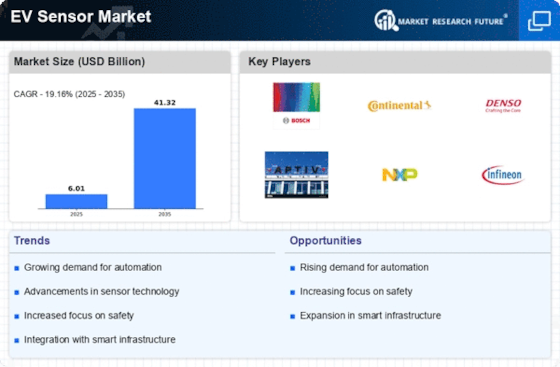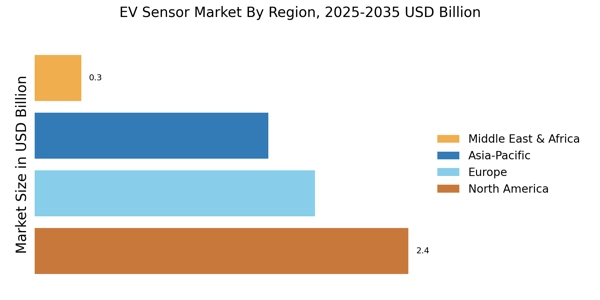Rising Demand for Electric Vehicles
The increasing consumer preference for electric vehicles (EVs) is a primary driver of the EV Sensor Market. As more individuals and businesses transition to EVs, the need for advanced sensors to enhance vehicle performance and safety becomes paramount. In 2025, it is estimated that the number of electric vehicles on the road will surpass 30 million units, creating a substantial demand for various sensors, including LiDAR, radar, and ultrasonic sensors. These sensors play a crucial role in enabling features such as autonomous driving, collision avoidance, and enhanced navigation. Consequently, the growth in EV adoption directly correlates with the expansion of the EV Sensor Market, as manufacturers strive to meet the evolving technological requirements of modern electric vehicles.
Government Regulations and Standards
Government regulations and standards play a pivotal role in shaping the EV Sensor Market. As countries implement stricter emissions targets and safety regulations, the demand for advanced sensor technologies in electric vehicles is likely to increase. Regulatory bodies are establishing guidelines that mandate the inclusion of specific sensor systems to ensure vehicle safety and environmental compliance. For example, the introduction of regulations requiring advanced driver-assistance systems (ADAS) in new EV models is expected to drive sensor adoption. By 2025, it is anticipated that over 60% of new electric vehicles will be equipped with ADAS, significantly impacting the EV Sensor Market. This regulatory push not only enhances consumer safety but also propels manufacturers to innovate and develop cutting-edge sensor solutions.
Growing Investment in Smart Infrastructure
The trend towards smart infrastructure development is emerging as a crucial driver for the EV Sensor Market. As cities and regions invest in smart transportation systems, the integration of electric vehicles with intelligent infrastructure becomes increasingly important. This includes the deployment of smart traffic management systems, charging stations equipped with advanced sensors, and vehicle-to-infrastructure communication technologies. By 2025, investments in smart infrastructure are projected to reach several billion dollars, creating a favorable environment for the growth of the EV Sensor Market. The synergy between electric vehicles and smart infrastructure not only enhances operational efficiency but also improves the overall driving experience, thereby encouraging further adoption of EVs and their associated sensor technologies.
Consumer Awareness and Environmental Concerns
The rising consumer awareness regarding environmental issues is significantly influencing the EV Sensor Market. As individuals become more conscious of their carbon footprint, the shift towards electric vehicles is accelerating. This heightened awareness is driving demand for sensors that enhance the sustainability and efficiency of EVs. In 2025, it is expected that consumer preference for eco-friendly vehicles will lead to a 25% increase in electric vehicle sales compared to previous years. Consequently, the EV Sensor Market is likely to benefit from this trend, as manufacturers develop sensors that not only improve vehicle performance but also contribute to reducing emissions. This alignment with consumer values is essential for the continued growth and acceptance of electric vehicles in the market.
Technological Advancements in Sensor Technologies
The rapid evolution of sensor technologies significantly influences the EV Sensor Market. Innovations in sensor design, miniaturization, and integration capabilities are enhancing the functionality and efficiency of sensors used in electric vehicles. For instance, advancements in artificial intelligence and machine learning are enabling sensors to process data more effectively, leading to improved decision-making in real-time driving scenarios. By 2025, the market for advanced sensors is projected to grow at a compound annual growth rate (CAGR) of over 15%, driven by the increasing complexity of EV systems. This technological progress not only enhances vehicle safety and performance but also fosters the development of new applications within the EV Sensor Market, thereby attracting investments and driving competition among manufacturers.
















